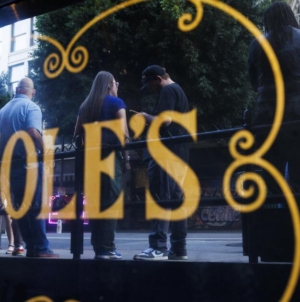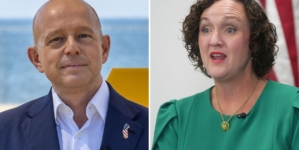-
Browns’ 2-Word Shedeur Sanders Message Has Fans Buzzing - 12 mins ago
-
What can we realistically expect from Vikings QB J.J. McCarthy in 2025? - 14 mins ago
-
Competition Authority Launches Proceedings against Airbnb - 21 mins ago
-
‘Trainwreck’ star John Cena says he was ‘run out’ of Hollywood early in career - 32 mins ago
-
Many voters undecided in governor’s race and about redistricting. - 44 mins ago
-
Mandalorian Star Gina Carano Thanks Elon Musk As She Settles Disney Lawsuit - 59 mins ago
-
2025 FedEx St. Jude Championship tee times, pairing, featured groups for Friday’s Round 2 - about 1 hour ago
-
Canyon fire explodes to nearly 5,000 acres; thousands evacuated in L.A., Ventura counties - about 1 hour ago
-
Foreign Minister Welcomes U.S.-Russia Talks as “Hope for Central Europe” - about 1 hour ago
-
California Breaks Near-100 Year Temperature Record - 2 hours ago
Law firm in L.A. homeless case bills $1.8 million for two weeks’ work
A high-profile law firm representing the city of Los Angeles in a sweeping homelessness case submitted an $1.8-million invoice for two weeks of work in May, according to records reviewed by The Times.
The invoice from Gibson Dunn & Crutcher LLP comes as the city is already under serious financial pressure, caused in part by rapidly growing legal payouts.
With at least 15 of Gibson Dunn’s lawyers billing at nearly $1,300 per hour, the price tag so far equates to just under $140,000 per day over a 13-day period.
Gibson Dunn, while representing the city of Grants Pass, Ore., recently secured a landmark ruling from the U.S. Supreme Court that upheld laws barring homeless encampments in public spaces.
Los Angeles officials retained the law firm in May, roughly a week before a seven-day evidentiary hearing to determine whether control over the city’s homelessness programs should be taken away from Mayor Karen Bass and the City Council and turned over to a third-party receiver.
A month later, U.S. District Judge David O. Carter issued a scathing ruling, saying the city failed to adhere to the terms of a three-year-old settlement agreement with the L.A. Alliance for Human Rights, which calls for the creation of 12,915 homeless beds or other housing opportunities by June 2027.
Still, Carter also concluded that “this is not the time” to hand control of the city’s roughly $1 billion in homelessness programs to a third party.
Matthew Umhofer, an attorney representing the Alliance, said the city paid big money to Gibson Dunn in a failed attempt to wriggle out of its legal obligations.
“The city should be spending this money on complying with the agreement, and/or providing services to the people who need them,” he said. “Instead, they are paying a law firm to fight tooth and nail against obligations that are clear in the settlement agreement — and that a judge has affirmed they are in violation of.”
The invoice, which The Times obtained from the city attorney’s office, lists a billing period from May 19 to May 31, covering a week of preparations for the high-stakes federal hearing, as well as four of the seven trial days — each of which typically lasted eight or more hours.
Theane Evangelis, head of the Gibson Dunn team representing the city, referred questions about the invoice to the city attorney’s office.
Karen Richardson, a spokesperson for City Atty. Hydee Feldstein Soto, said in a statement that Gibson Dunn “did an outstanding job of stepping into a crucial matter that had been in litigation for nearly 5 years before they were hired,” compressing “what would normally be years worth of work into a very short time period.”
“We are grateful for their service and are in the process of reviewing the expenditures … to ensure that we go back to Council with a complete picture of what was done and charged,” she said in a statement.
The city retained Gibson Dunn just as council members were signing off on hundreds of employee layoffs, part of a larger strategy for closing a nearly $1-billion budget shortfall. The first batch of layoff notices was scheduled to go out this week.
The City Council initially appropriated $900,000 for Gibson Dunn, for a period not exceeding three years, according to the firm’s contract. Going over $900,000 required prior written approval from the city attorney, according to the contract.
The law firm quickly surpassed that threshold, eventually billing double the specified amount.
During the seven-day hearing, Gibson Dunn took a highly aggressive posture, voicing numerous objections to questions from attorneys representing the Alliance, as well as two organizations that intervened in the case.
Councilmember Bob Blumenfield, who serves on the council’s homelessness committee, said the city attorney’s office did not advise him that Gibson Dunn’s legal costs had reached $1.8 million in such a short period. Blumenfield, who represents part of the San Fernando Valley, said he is “not happy” but is reserving further comment until he receives more specifics.
Three months ago, Blumenfield co-authored a motion with Councilmember Tim McOsker seeking regular updates on the Alliance litigation — both from Gibson Dunn and the city attorney’s office.
McOsker, who serves on the budget committee and spent several years running the city attorney’s office, also did not receive notification of the Gibson Dunn $1.8-million invoice from the city’s legal team, according to Sophie Gilchrist, his spokesperson.
Gilchrist said her boss had asked for regular updates to “prevent any surprises in billing” related to the Alliance case.
“That’s why the Councilmember is requesting that this matter be brought to City Council immediately, so the City Attorney can provide a full accounting and discuss all invoices related to the case,” she said.
Gibson Dunn has filed a notice of the city’s intent to appeal at least portions of Carter’s ruling, which ordered a third-party monitor to review and verify the data being produced by the city on its housing and encampment goals.
Carter signaled that he probably would order the city to pay the legal fees of the Alliance and homeless advocacy groups that have intervened in the case. So far, the Alliance has sought $1.3 million from the city to cover its legal expenses incurred since April 2024.
In a statement to The Times earlier this week, Evangelis, the Gibson Dunn lawyer, cited the judge’s “suggestion that the Alliance may recover attorneys’ fees” as one reason for the appeal.
“The City believes that its resources should be spent providing services to those in need, not redirected to the Alliance’s lawyers — particularly when the district court has rejected most of their arguments,” she said.
Source link






























